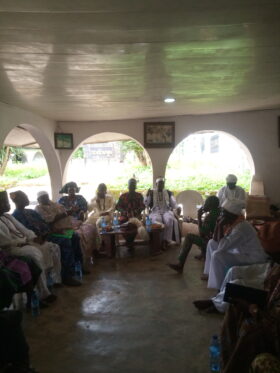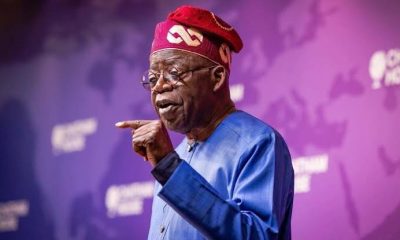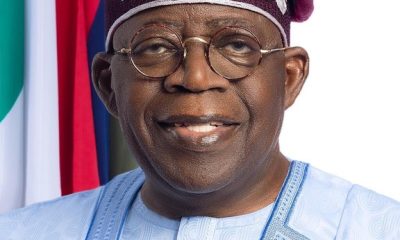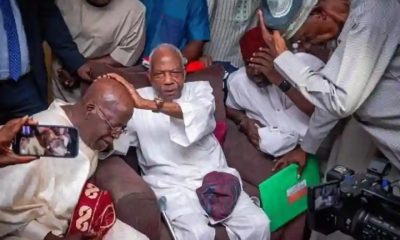Headline
Group begs Tinubu to intervene in Muslims, Isese adherents crisis

The Ancient Religion Societies of African Descendants International Council (ARSADIC) has appealed to President Bola Tinubu to intervene in the crisis between some Muslim faithful and traditionalists over the celebration of Isese festival in Ilorin, Kwara.
The president of ARSADIC, Ifagbenusola Atanda, while speaking at a news conference in Ile-Ife, Osun on Tuesday, begged the president to ensure adequate security protection for traditional religion adherents in the country.
“We call on President Bola Tinubu to caution the Kwara state government from banning traditionalists from worshipping and celebrating their traditional festivals, for such action could lead to religious crisis.
“The traditional worshippers know their boundary not to throw offensives at other faiths.
“We will resist any attempt to trample on our rights to freedom of religion and association as spelt out in the Nigerian Constitution,” Atanda said.
He equally called on the Inspector-General of Police(I-G), Kayode Egbetokun, to prevent arbitrary arrest of Isese adherents by the police in Ilorin.
“We are calling on the IGP to investigate the recent arrest of some traditional worshippers in Ilorin by the police and the handling of the case, and sanction anybody that is culpable.
“The government should ensure equity among the three recognised religions of Christianity, Muslim and traditionalist,” he added.
Atanda condemned the recent clash between an Ilorin-based traditional worshipper, Yeye Omolara Ajesekemi and some Muslim faithful at the Yemoja River in the Oko Olowo area of the metropolis.
“Yeye Omolara Ajesekemi has our support at all times to practice her faith, the traditional religion which bonds all of us together,” he said.
According to him, the three religions worshippers have been living harmoniously in the state for years.
Atanda maintained that the group was ready to defend the rights of the traditional adherents, noting that traditional worshippers would not fold their arms and allow infringement on their fellow adherents.
He called on the state government, state house of assembly, royal fathers and other stakeholders to protect the interest of traditionalists in the state.
Headline
EFCC bars dollar transactions, orders embassies to charge in naira

The Economic and Financial Crimes Commission has barred foreign missions based in Nigeria from transacting in foreign currencies and mandated them to use Naira in their financial businesses.
The EFCC has also mandated Nigerian foreign missions domiciled abroad to accept Naira in their financial businesses.
The anti-graft agency said the move is to tackle the dollarisation of the Nigerian economy and the degradation of the naira
The Commission, therefore, asked the government to stop foreign missions in Nigeria from charging visa and other consular services in foreign denominations.
The EFCC gave the advisory in a letter to the Minister of Foreign Affairs, Amb. Yusuf Tuggar, for onward transmission to all foreign missions in the country.
In the letter, the EFCC said it issued the advisory because the practice of paying for consular services in dollars was in conflict with extant laws and financial regulations in Nigeria.
In a letter dated April 5, 2024, which was addressed to the Minister of Foreign Affairs, Ambassador Yusuf Tuggar, titled: “EFCC Advisory to Foreign Missions against Invoicing in US Dollar,” the EFCC Chairman, Ola Olukoyede expressed dismay over the invoicing of consular services in Nigeria by foreign missions in dollars.
The EFCC cited Section 20(1) of the Central Bank of Nigeria Act, 2007, which makes currencies issued by the apex bank the only legal tender in Nigeria.
The letter read, “I present to you the compliments of the Economic and Financial Crimes Commission, and wish to notify you about the commission’s observation, with dismay, regarding the unhealthy practice by some foreign missions to invoice consular services to Nigerians and other foreign nationals in the country in United States dollar ($).
“It states that ‘the currency notes issued by the Bank shall be the legal tender in Nigeria on their face value for the payment of any amount’.
“This presupposes that any transaction in currencies other than the naira anywhere in Nigeria contravenes the law and is, therefore, illegal.”
The commission further stated that the rejection of the naira for consular services in Nigeria by certain missions, along with non-compliance with foreign exchange regulations in determining service costs, is not just unlawful but also undermines the nation’s sovereignty embodied in its official currency.
The letter continues: “This trend can no longer be tolerated, especially in a volatile economic environment where the country’s macroeconomic policies are constantly under attack by all manner of state and non-state actors.
“In light of the above, you may wish to convey the commission’s displeasure to all missions in Nigeria and restate Nigeria’s desire for their operations not to conflict with extant laws and regulations in the country.”
Diplomatic sources said yesterday, May 10, that some embassies were wondering whether the EFCC’s advisory represented the position of the Federal Government.
Headline
Prince Harry visits sick Nigerian soldiers in Kaduna

Prince Harry and his team visited the 44 Nigerian Army Reference Hospital in Kaduna to interact with wounded soldiers who are receiving treatment.
The Duke of Sussex is in Nigeria with his wife to champion the Invictus Games, which Harry founded to aid the rehabilitation of wounded and sick servicemembers and veterans.
Nigeria joined the Invictus Community of Nations in 2022 becoming the first African country to join.
Prince Harry’s visit to Kaduna came 68 years after his late grandmother Queen Elizabeth II visited the state during the time of the late Premier of Northern Region Sir Ahmadu Bello.




-

 Business6 days ago
Business6 days agoNigeria needs over $2bn to revive Ajaokuta Steel Plant, says Minister
-

 Headline6 days ago
Headline6 days agoSuspend cybersecurity levy– Reps to CBN
-

 Headline4 days ago
Headline4 days agoPrince Harry visits sick Nigerian soldiers in Kaduna
-

 Entertainment4 days ago
Entertainment4 days agoAMVCA Cultural Day: BBNaija’s Neo, Venita win Best Dressed Male, Female
-

 Headline6 days ago
Headline6 days agoTinubu resumes work after foreign trip
-

 News6 days ago
News6 days agoShan George’s money returned to Zenith Bank account
-

 Metro4 days ago
Metro4 days agoEx-Sports Minister laments after hospital neglected him for hours over N80000 deposit













